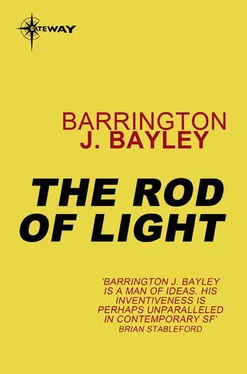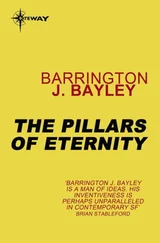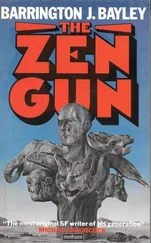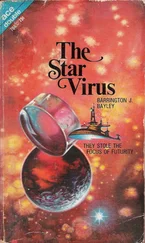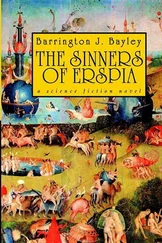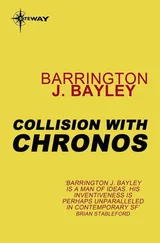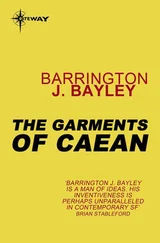Barrington J. Bayley
THE ROD OF LIGHT
For Elise Pechersky
who prompted me to finish
Reddened and magnified, the sun had descended through a clear sky and was poised over the edge of the hilly landscape, when its radiance picked out a burnished metal figure that had climbed to the summit of a turfed ridge. The traveller paused, and for a considerable while gazed intently at the mellowed orb, as though endeavouring to return its eternal stare. For his eyes, like the evening sun itself, were also red and glowing, and seemed to project the same intense presence.
His body was bronze-black, man-shaped and handsome, decorated from head to foot with scroll-like engravings. The face was an enigma: an immobile machine-visage, its expression stern yet hinting at tenderness. Suddenly the robot’s head tilted up, as his attention was caught by a glint of golden light. The sun had caught the underside of a plane’s wing, moving slowly on the end of a newly appeared contrail.
Jasperodus stepped back into the shadow of the ridge, and waited half-kneeling, one arm rested on a bended knee, hoping that the plane’s pilot had not, in turn, spotted him.
When he emerged the plane was gone, and for the first time he looked down the west-facing slope.
He saw a compact, cirque-like valley. Toward the bottom of the slope, a little to his left, stood a building, the first he had come across in this wilderness. It was about the size of a three-storey villa but had the form of a ziggurat, constructed of well-fitting stone blocks, with a porch projecting from one side. In front of this porch stood an oddly shaped cowl, also carved from stone, which acted as a windshield for an elegant bowl mounted on a pedestal. In the bowl, a pale flame burned.
The place had the appearance of a temple. Jasperodus was surprised to find an intact and apparently inhabited building of any kind in so isolated a spot. He estimated its age at no more than a hundred years, in which case it was of no interest to him archaeologically, having been built long after the collapse of the Old Empire. He would have passed it by, had not his sighting of the aircraft disconcerted him. These bare hillsides offered little concealment from what could possibly be a photographic reconnaissance with robots as its object. He would try to take shelter in the building until dark.
Making his way down the slope, he reached the porch, lingering to inspect the fire in the bowl. The wick was a fleecy wad floating in perfumed oil. The flame burned steadily. It was alive with sparkling flecks which swarmed up it to vanish at its fringe, releasing a powerful scent of roses.
Jasperodus found the arrangement charming. Cautiously he stepped into the porch, to find the passage blocked by a slab of reddish stone he recognised as porphyry. He pounded on it with his fist, tuning up his hearing so as to detect any response. He heard nothing, and began to think the building unoccupied after all, but then there came the hiss of a pneumatic mechanism, and the slab drew aside.
In its place was revealed a silvery panel, or screen, on which an image was slowly forming. It was of a tall, slender man in a light blue gown. He would be aged about sixty, with flaxen hair falling to his shoulders. His eyes matched the gown: pale blue. They were hypnotically steady as they rested on Jasperodus, and his lips moved.
‘What brings a servant of Ahriman to the Temple of Light?’ asked a resonant, though rather high-pitched voice.
Jasperodus took a moment before replying. ‘I am no one’s servant,’ he said evenly. ‘I am a free construct. May I shelter under your roof for a while?’
The gowned man looked him up and down thoughtfully, though no camera to convey his image was visible. ‘You ask for shelter? Do you feel the cold, robot?’
‘No, I do not feel the cold,’ Jasperodus said. Suddenly impatient, he reached out and clawed down the silvery screen. It was silky and ripped easily. But ten feet further along, the passageway was again blocked by a second slab of porphyry.
‘It is understandable that you should fear me,’ he said, disgruntled. ‘Very well, then, I shall bother you no further.’
Soon it would be dark. He decided to remain in the porch till after sunset, and then be on his way. But now the man spoke again, his voice slightly slurred.
‘I do not fear you, robot. Come, enter the Temple of Light. After all, you are a creature.’
With a hiss the second block of porphyry slid aside. Jasperodus went forward. Behind him, the barrier closed up again.
He found himself in a simply furnished room, the walls and ceiling painted sky-blue. The man whose image had appeared on the screen stood beside a low table, laid with a half-full wine decanter and a glass goblet.
Clearly this was a living chamber. An ottoman, long enough to double as a sleeping couch, stood against one wall. Domestic articles—silver cups and platters, bottles, wooden caskets, combs and brushes—occupied a shelf running the length of the wall opposite. Otherwise the furniture consisted only of the table and two stout timber chairs.
There were no windows—the ziggurat did not appear to possess any. Lighting was by means of a bright oil lamp hanging from the ceiling, close to a flue for carrying away the fumes, while ventilation grills were set high in the walls.
The blue-eyed man was regarding Jasperodus with a peculiarly intense expression. He reached out, refilling the goblet from the decanter. Then he sat down, gesturing.
‘Be seated, Ahriman.’
Though equally comfortable standing, Jasperodus gingerly settled his weight in the remaining chair. It cracked, but held.
‘My name is not Ahriman.’
‘All robots should be called Ahriman,’ said the temple-keeper, for this was what Jasperodus by now presumed him to be. He was, it was becoming evident, somewhat drunk. ‘But never mind. What is your business in this region?’
‘I am an archaeologist,’ Jasperodus told him, ‘on my way to join my assistants who are carrying out a dig to the north-west of here. I travel on foot to be less conspicuous. As you may know, the Borgor Alliance has been making incursions into this area, and Borgors destroy robots out of hand.’
The templar nodded. ‘So I believe. You are an archaeologist, you say? But also you claim to be a free construct. What interest could archaeology possibly have for you?’
‘I study the past to seek the cause of historical change,’ the robot said in an intentionally neutral voice. ‘We emerge from a turbulent dark age. Why did the splendid Rule of Tergov that preceded it collapse like a house of cards? Is there a law of history that brings calamity just when civilisation seems about to fulfil itself? This is what I aim to find out.’
‘I repeat, why should you?’ The templar sounded querulous, and Jasperodus became uneasy. Had his wish to learn something of the temple made him divulge his own circumstances too freely?
‘I owe it to those who made me,’ he said simply.
‘You have an instruction? So you are not so free after all.’
‘There is no instruction. It is of my own choosing.’
The man grunted. He almost scowled. ‘Then this is an unusual sentiment. What can the advance of human civilisation mean to you? You are a robot. Not a man.’
‘And the difference…?’
Making a dismissive face, the templar gulped wine, spilling it from the corners of his mouth and dribbling it down his gown. Then, with an air of self-possession, he brushed away the drop.
‘Can you tell me something about this place?’ Jasperodus asked. The Temple of Light, you called it. Also you insisted on forcing an identification with someone called “Ahriman” upon me. This is the mythic projection, perhaps? Is Ahriman one of the robotic gods?’
Читать дальше
